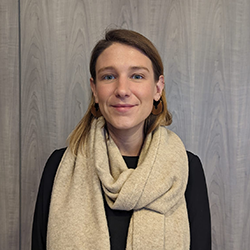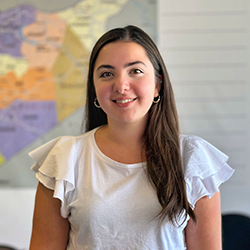Priority Theme Spotlight: Anne Piotte and Vana Minassian (Search for Common Ground)



Author: Jaclyn Leaver
Theme: Displacement, Migration, and Integration
In today’s Priority Theme Spotlight we spoke with Anne Piotte, Program Director, and Vana Minassian, Program Officer, at Search for Common Ground, an EGAP institutional member. Search for Common Ground is a non-profit organization with a focus on building sustainable peace by working with all sides of a conflict, providing the tools needed to work together and finding constructive solutions. We asked about the report “Fostering Social Stability Through Strategic Communications,” and discussed how to improve social cohesion between refugees and host communities.
This report focuses on tensions between the Syrian and Lebanese communities, as well as tensions within the Lebanese community itself in Lebanon. In it, you mention that the current narrative around refugees is that they are a “substantial economic burden and a major risk to social stability in the country.” What are some of the reasons that this narrative exists?
Anne Piotte and Vana Minassian: Over the past few years, Lebanon has been facing numerous sources of conflict such as a collapsing economy, rising prices, increased unemployment, the COVID-19 pandemic, constant political turmoil, and nation-wide protests which have erupted as a result of the declining socio-economic conditions. Those conditions have driven many below the poverty line. In addition, Lebanon hosts the highest number of refugees per capita in the world. These have been some of the factors contributing to the spread of a very powerful narrative amongst Lebanese—that refugees are a great economic burden and pose a major risk to the country’s social stability. To make matters worse, on August 4, 2020, Lebanon experienced one of the largest, non-nuclear blasts in history—the Beirut port blast. This caused vast destruction, loss of life, and social trauma, further straining capacity for stability and fueling destructive narratives. In the face of this adversity and the country’s ongoing challenges, Search launched its Strategic Communication project—a comprehensive, local-level engagement initiative accompanied by a national media campaign aimed at creating social cohesion.
As part of this project, you launched a program designed to create spaces for dialogue and opportunities for host communities to shift their public perceptions about refugees. What were the key features of this program?
AP and VM: The project aimed to cultivate collaborative and positive dialogues and narratives, and to shift public perceptions towards greater trust and respect amongst and between host and refugee communities in target locations across Lebanon, notably by leveraging youth-led and grassroots approaches.
Twenty-four youths, representatives of local communities that we referred to as “Champions” were identified across six regions (Baalbek-Hermel, Central and West Bekaa, Akkar, Mount Lebanon, North Lebanon, and Beirut), specifically in areas with a higher propensity for tension. They included both Lebanese and Syrian representatives, from various socio-economic and religious backgrounds. The Champions then participated in a number of trainings designed to help them better understand their communities and engage them in a transformative, yet sensitive way.
They committed to a personal investment in stability in their community through promoting inter- and intra-Lebanese dialogue about local dynamics and current events, and piloting grassroots-level initiatives that build trust and cohesion. Common dialogue topics emerged across the six regions, including: gender-based violence, collaboration during Lebanon’s crises, self-care during lockdown, religion, and sectarianism. Groups also addressed specific cases of conflict in need of resolution relevant to their home communities. Champions reported positive changes in how community members accept new topics and opinions across the dialogue processes. Dialogue participants benefited from sharing their own experiences, learning from others, and growing the respect necessary for peaceful cohabitation and collaboration.
Since face-to-face engagement and dialogue have proven to strengthen bonds, evoke positive feelings, and personalize new experiences, we also collaborated with two local NGOs—Seenaryo Women’s Theater, which promotes learning and healing through theater, and CodeBrave, which focuses on technology entrepreneurship, digital skills, coding, and sports to incorporate cohesion-fostering dialogue into ongoing programming. Leveraging those, the Champions learned how to use these online spaces to spread positive narratives and defuse tensions.
Finally, to spread awareness of these efforts and increase their impact, Search launched the #OneAct Media Campaign, which highlighted the compassionate acts of the project’s Champions, individuals, local organizations, and influencers across the country. Community members were encouraged to promote and share stories from their own neighborhoods as part of the campaign, leading thousands of stories to be shared.
What were your achievements from the project?
AP and VM: The project built a network of 24 peace-builders (Champions), and empowered them to implement 24 community initiatives that focused on alleviating tensions, promoting collaboration, and building trust in their communities. The initiatives directly engaged 376 individuals, including both Lebanese and Syrians. More than 60 percent of our participants were women. Some examples of the initiatives include:
- Bringing together Bikfaya and Beit Chabeb, two villages on opposing sides of the civil war, through the rehabilitation of a hiking path connecting them. This was followed by a series of publicized hiking events, connecting people together across divides.
- Lebanese and Syrians were gathered around first aid training and support throughout the pandemic. The initiative brought people together from different backgrounds and encouraged collaboration, in addition to equipping these communities with both the essential healthcare kits and knowledge to respond to emergencies and provide primary healthcare.
The project implemented 210 dialogue sessions through its Champions and partners CodeBrave and Seenaryo. Dialogue sessions were originally designed to build empathy, increase collaboration, and change perceptions; they evolved into central spaces for coping and healing in response to trauma induced by Lebanon’s multiple crises. Seenaryo hosted participatory theater and artistic events attended by 335 individuals. Play activities intermingled with cross-cultural discussion were found particularly valuable for children and youth rendered homeless by the blast at Beirut’s port. Over 95 percent of participants who did not believe that greater dialogue and interaction could improve relations amongst and between different groups (inter- and intra- Lebanese, Lebanese and Syrian), indicated the project changed their beliefs.
The #OneAct campaign reached above 1.5 million individuals, about 25 percent of the total population of Lebanon. Through posts on Facebook and Instagram, Search amplified the value of Champions’ initiatives and fostered the development and promotion of user-generated content that matched the tenor and tone of the campaign. Response to the campaign was overwhelmingly positive, and while viewership was highest in the targeted age bracket of 25–34, engagement from other brackets (e.g., 18–24 and 35–55) did incredibly well. Both unexpectedly and encouragingly, content featuring Syrian refugees achieved higher engagement rates than content focused solely on intra-Lebanese relations.
What are the implications of the lessons learned from this project for governments, civil society organizations, and NGOs working to improve social cohesion between refugees and host communities throughout Lebanon and, if applicable, in other countries?
AP and VM: In the project design, Search approached sustainability, diversity, and grassroots-level engagement as a central element, which paved the way to engender deep change. By involving people from all socioeconomic backgrounds to positively impact themselves, their own communities, and one another, sustained networks and communities were built. Participants and community members developed transferrable skills and world views through engaging local-level participants in sensitive relationship and perception-based change. During the course of the project, 78 participants in Champions’ discussion sessions reported developing friendships with at least one person of a different nationality, including all seven participants who initially reported having no friends of any nationality other than their own.
It is essential to highlight the adaptive design and key activities which allowed for the objective of the project to be achieved, this includes: the initial research and analysis in addition to the constant monitoring of the context changes and tension analysis reports, Champions’ training and youth-led community dialogues across Lebanon, and community initiatives that promoted stability and social cohesion. The project’s results and impact were further strengthened by a transversal and comprehensive media strategy, which included direct, locally-drafted response to contextual changes and tensions, and social media campaigns which addressed community concerns and promoted positive engagement.
Local-level action has shown that communities lack awareness of mediation mechanisms, thus a stronger focus on the training and integration of local mediators and peace-building mechanisms would serve the country well, such as the case of the Champions. Pairing these services with other development and humanitarian projects can ensure continued engagement and sustainability, and leverage the strengths of other local and international partners.